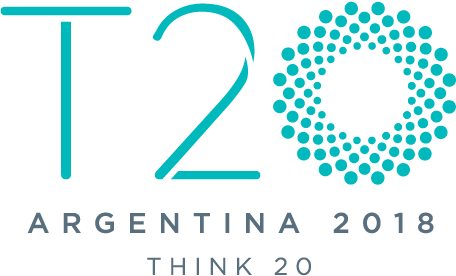As one of the three priorities on the agenda of the Argentine presidency, the Think 20 (T20) also covered the Task Force´s topic “the future of work and education”.
When Argentina took on the presidency of the G20 it determined the future of work to be one of the three priorities which it will intend to contribute to throughout the year. This topic was talked about during the first meeting between finance ministers and presidents of central banks on the 19 and 20 of March in Buenos Aires.
The subject is extremely important for the T20 Argentina. At this stage of the process, Task Forces are developing public policy documents on this topic. The co-chairs and members of “the future of work and education” Task Force will cover the following main topics:
New social contracts for the digital era
Technology is structurally changing labour markets around the world. Workers with a long term contract and social benefits are gradually disappearing and giving way to more flexible work relationships. For the Task Force, the aim is to define the type of social contract that is formed between this new link between businesses, workers and the State, and how the diagram of responsibilities and agreements should be between all those involved.
Global standards for new work relationships on digital platforms
The emergence of global digital platforms changes the way in which goods and services are exchanged. Understanding how the the platforms´economy works, what tax and regulatory role states should take and how labour markets are affected by its appearance is key to evaluate the impact in terms of services.
Teaching and learning skills in the 21st century
The technological changes have had two effects on labour markets. On one hand, a number of skills, generally associated with routine tasks, become obsolete and are replaced by automated processes. On the other hand, a set of new skills emerge that complement and strengthen the new technologies. As a result, there are workers that are displaced and others that are motivated. Experts are looking to anticipate what the skills of the future will be like, how they will change and adjust the education system to adapt it to this situation and prepare competent workers to form part of the labour market of the new era.
Measuring the digital economy and its impact on work
In reality, there exists a data gap and there are problems in measuring the digital economy and how technology is changing the labour market´s demand for skills. The objective of this topic is to study what would need to exist to measure this economy.
Education financing
The need to modify the education system, as mentioned previously, may include teaching professors in a new way or modifying the classroom with more technology and digital devices – but this raises the question of how to fund the reform. The Task Force will look to find out how education financing should be, both in developed and undeveloped countries.
Technology and economic development
In addition to establishing what the skills of the new labour market will be in the digital era and how to teach and learn in this context, it is necessary for the changes in job offers to correlate with the demand for work. Experts will look to determine what types of domestic factors prevent the adoption of new technologies and which of these can be used as a platform to develop a productive system.
